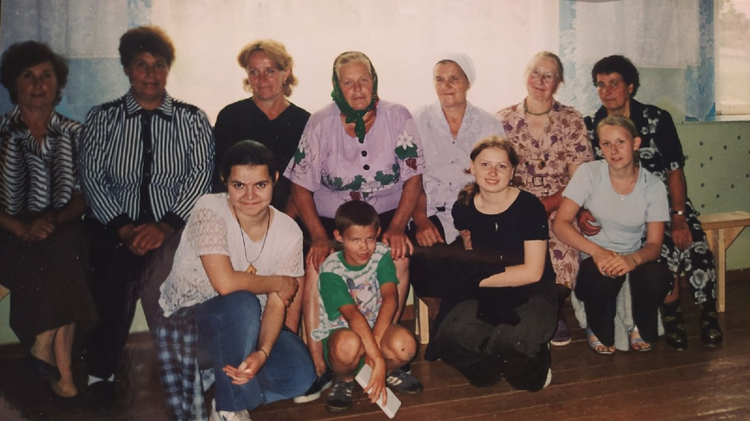Article by Tatiana Naryshkina
Siberia is a multinational, spacious, wide, and very soulful region. Despite the fact that it is very cold. The leaves on the trees appear here only in mid-May, and in September and even August, it often snows. That is why the indigenous Siberian inhabitants had the most developed cattle breeding, gathering, and hunting. And the settlers who moved here in several “waves,” starting from the 16th century, tried to adopt the well-known agriculture and adopted the peculiarities of local life from the indigenous peoples.
Someone moved to Siberia hoping for a good and rich life (once gold was found, and the Siberian gold rush began), some were forcibly relocated to develop new lands by the government. The border areas of Transbaikalia (also known as Transbaikal) were especially distinguished by this. The first settlers were Cossacks, who went to explore the territory and looked at what they could profit from here. They set up prisons and first settlements, from which cities later grew. Well, we must not forget about convicts – people of different classes, often educated and intelligent, who later stood at the origins of Siberian cultural life in cities.
Therefore, in Siberia, on its vast territories, descendants of various ethnic groups and nationalities coexist. That’s why it’s so interesting to collect folklore material; songs, games, rituals. Talk to people. Especially in the light of the recent and ongoing events.
You go from one village to another; there live immigrants from Ukraine, who burn bonfires on Ivan Kupala (Kepala Night, a traditional Slavic holiday), cook lard and starches, and speak their own Ukrainian-Siberian dialect:
– Do you speak Ukrainian?
– What? We don’t understand you.
– Don’t you want to come back to Ukraine?
– No, we grew up here. This is our home, in Siberia.
And they sing songs:
“Kolyadyn, kolyadyn, I’m the only son of my father.
Please do not torture me, give me Gorilochki.
If you don’t have gorivka, give me a coin.
If you do not have a simple coin, give me a gold one.
In a dialect: Hello, the owner with the hostess!” (Caroling. Recorded from Zoya Grigoryevna Kutz, born in 1931. Verkhnyaya Urya village, Irbeysky region, Krasnoyarsk Krai)
When we went to the neighboring district, there were immigrants from Belarus living there. They make draniki and dumplings, embroider carpets with national floral patterns and sing:
“Spring is red, where is your daughter Ulyanka.
Ulyanochka, drove the bulls to the wounds.
On the wounds, graze the bull under the lime tree.
Under the lime tree, and I’ll ride with Phillipa” (Spring. Recorded from Anna Semenovna Romanova, born in 1922, the village of Orlovka, Birilussky region, Krasnoyarsk krai)
That’s how I traveled to villages as part of folklore expeditions. For example, in the village of Eliseevka, we lived in a bakery, ran after pigs to take pictures, celebrated Ivan Kupala, and learned folk dances and games (one of them is “Serbianochka – the one from the album “Wild Games” of our project Vedan Kolod).
In the village of Verkhnyaya Urya, we sang Ukrainian songs and Russian cruel romances, prison, and orphan songs from a migrant from Altai and recorded them. And in the village of Orlovka, we heated a “black bathhouse,” slept in an abandoned house, and took pictures with tractors.
However, it is not always necessary to go far into the woods in order to record good material. So we recorded a few unique songs from a neighbor in the house, an old grandfather who sat on a bench and joked every time he looked at me: “Didn’t you wash your eyes?” (I have brown eyes). He also sang Ukrainian songs of new settlers and Siberian old-timers. He moved to Siberia after WWII.
The Russian population can be judged by the songs, depending on when and how people got to Siberia. So, the songs here are usually divided into two main groups:
1) songs of old-timers (the first settlers who came to Siberia before the middle of the XIX century);
2) songs of settlers who came to Siberia in the late XIX — early XX centuries during the period of mass, often forced settlement.
There are also Cossack songs. You can find texts about valor, death, love, and war that predominate among them. Because Cossacks are a military class. These songs are mostly very rhythmic and driving.
There are prison, convict, and robber songs. They are chanting, drawing, and mournful. There is the same Russian linear polyphony with a lot of vocalizations, “entrances” to the notes, and long chants of vowels in these songs.
“Robbers are coming from those dense forests
In our hands, we are holding our friend
He is being carried,
The stretcher is not simple and is made with riffles.
(Robber. Recorded from Stepan Innokentievich Ternykh, born in 1919, Krasnoyarsk)
There are songs of old-timers of Siberia. Their culture and language are now considered the most archaically preserved Russian language. They live throughout Siberia, from the Urals to Trans Baikal Territory. Some are closely assimilated with the late arrivals, others have been trying to live apart since our time.
Some recordings from the Irkutsk region migrants can be listened to at the Antonovka Records label:
1) https://antonovkarecords.bandcamp.com/album/fly-fly-you-hardened-arrow-round-dance-songs-of-polish-old-believers-from-altai – Polish migrants
2) https://antonovkarecords.bandcamp.com/album/made-in-novyny-songs-of-golendra-people-from-siberia-irkutsk-region – Golendra migrants
3) https://antonovkarecords.bandcamp.com/album/agronom-yurri-songs-of-chuvash-people-from-siberia-irkutsk-region – Chuvash migrants
4) https://antonovkarecords.bandcamp.com/album/farewell-my-dear-native-village-songs-of-ukrainians-from-siberia-irkutsk-region – Ukrainian migrants
5) https://antonovkarecords.bandcamp.com/album/manilovskaya-romanenkina-songs-of-veps-people-from-siberia-irkutsk-region – Veps migrants
6) https://antonovkarecords.bandcamp.com/album/urman-songs-of-kryashens-from-siberia-irkutsk-region – Kryashen migrants
7) https://antonovkarecords.bandcamp.com/album/marininsk-songs-of-belarusians-from-siberia-irkutsk-region – Belarus migrants


